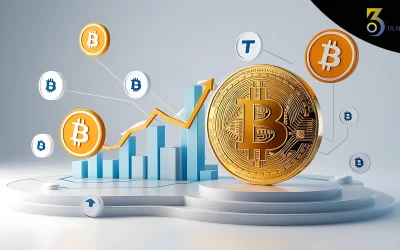Cryptocurrencies, once seen as a fringe market, have become increasingly integrated into the broader financial system. With this growing integration, global economic events now have a significant influence on the prices of digital currencies like Bitcoin, Ethereum, and others. Unlike traditional markets, where central banks and governments exert direct control, cryptocurrency markets react differently to world events due to their decentralized nature. However, the impact of major economic developments on crypto prices is undeniable.
1. Economic instability and market uncertainty
Global economic instability, such as recessions, inflation surges, or geopolitical tensions, tends to drive up demand for alternative assets like cryptocurrencies. Just as investors turn to gold during times of crisis, they now increasingly see digital assets as a hedge against market uncertainty and currency devaluation. For example, during economic slowdowns or banking crises, many investors have shifted their funds into Bitcoin due to its limited supply and decentralized nature, which can protect against inflation and loss of value in traditional currencies.
However, this isn’t a universal rule. In some cases, economic uncertainty can also lead to panic selling, where investors liquidate their digital assets in favor of more stable investments, such as government bonds or fiat currencies. The key factor is how investors perceive the severity of the event and the relative safety of their investments.
2. Inflation and monetary policy
Inflation plays a pivotal role in shaping cryptocurrency prices. When inflation rates rise, central banks often respond by tightening monetary policy through interest rate hikes. Such policies reduce the liquidity available in the market, leading investors to reduce their exposure to riskier assets, including cryptocurrencies. As liquidity dries up, the demand for speculative investments like crypto decreases, driving down prices.
On the flip side, when central banks inject money into the economy through quantitative easing or reduce interest rates, investors tend to seek out assets that offer higher returns. In these situations, cryptocurrencies, known for their potential high returns, often benefit as more capital flows into the market.
3. Government Regulations and Policy Announcements
Government regulations can have an immediate and dramatic impact on cryptocurrency prices. A positive regulatory framework, such as the legalization of Bitcoin as legal tender or the approval of crypto exchange-traded funds (ETFs), can drive up demand and increase prices. Conversely, crackdowns on crypto trading, mining bans, or restrictive legislation can lead to sharp price drops.
For example, when China banned crypto mining and declared all cryptocurrency transactions illegal in 2021, the price of Bitcoin plummeted nearly 50% in a few months. On the other hand, when countries like El Salvador announced Bitcoin as legal tender, the markets experienced a temporary surge in prices due to increased optimism and market demand.
4. Global financial crises and stock market correlations
Many people believe that cryptocurrencies and traditional financial markets are separate entities. However, recent data shows a growing correlation between the stock market and crypto prices. Stock market crashes often trigger sell-offs in the crypto market during global financial crises. This trend was especially evident during the COVID-19 pandemic, where the initial stock market crash in March 2020 coincided with a significant drop in Bitcoin and other crypto prices.
This growing correlation can be attributed to the increasing presence of institutional investors in the cryptocurrency market. As more hedge funds, investment banks, and asset management firms enter the crypto space, the behavior of crypto assets increasingly mirrors that of traditional assets. Institutional investors tend to liquidate crypto holdings during financial downturns to cover losses in other areas, further contributing to price declines.
5. Geopolitical tensions and the importance of Safe Haven assets
Geopolitical events like wars, trade disputes, or political instability can have a dual effect on cryptocurrency markets. In times of geopolitical tension, traditional fiat currencies can experience extreme volatility. As a result, investors often flock to cryptocurrencies as safe haven assets. Particularly, people view Bitcoin as “digital gold” because of its limited supply and resistance to government control.
For instance, during the Russia-Ukraine conflict, many investors shifted toward cryptocurrencies, fearing sanctions and restrictions on traditional financial markets. Ukrainian citizens also turned to Bitcoin and stablecoins to preserve their wealth in the face of a collapsing national currency. This demand spike contributed to price increases for certain cryptocurrencies during the conflict.
6. Technological advancements and global innovation
Financial crises and regulatory actions are not the only global economic events. Technological advancements and innovations can also impact cryptocurrency prices. Breakthroughs in blockchain technology, such as Ethereum’s transition to proof-of-stake or the development of decentralized finance (DeFi) platforms, can lead to increased investor interest and rising prices.
For example, when Ethereum announced its upgrade to Ethereum 2.0, promising greater scalability, security, and energy efficiency, the anticipation drove up the price of ETH. Similarly, the rise of non-fungible tokens (NFTs) and the growing popularity of decentralized applications (dApps) have created new use cases for various cryptocurrencies, attracting more investments.
Key Takeaways:
- Economic instability can drive demand for cryptocurrencies as a hedge, but it may also lead to panic selling.
- Inflation and central bank policies have a significant impact on crypto prices, with tighter monetary policy driving down demand.
- Government regulations and policy changes can cause sudden price surges or drops.
- Institutional investor activity has led to a correlation between cryptocurrencies and stock markets.
- Geopolitical tensions often lead to increased demand for digital assets as safe havens.
- Technological advancements in blockchain and DeFi create new opportunities for price growth in the crypto market.
Conclusion
Global economic events have a profound impact on cryptocurrency prices, shaping the market in ways that were once unimaginable. The through economic instability, inflation, government regulations, or geopolitical crises, the cryptocurrency market is highly reactive to external factors. As the world becomes more interconnected and digital currencies gain importance, traders and investors will need to understand the relationship between global economic events and crypto prices.
The forces that drive global markets increasingly influence cryptocurrencies, despite their initial design to operate independently of traditional financial systems. This makes it crucial for investors to stay informed and adaptable in an ever-evolving economic landscape.




